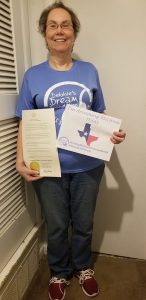Texas Chapter
Location
Fort Worth, TX
Contact Pamela Pierce | Email | (817)-320-3578
Pamela Pierce
Pamela’s cancer story began with a primary care doctor who sent me to a nephrologist due to prior kidney issues. To ensure her condition was not worsening, a standard blood panel showed anemia and a urine test showed slight blood in the urine. After three years of seeing the nephrologist and ensuring good kidney function, Pamela’s nephrologist suggested an iron infusion as well as a colonoscopy since she was of age. While hesitant, she agreed that she needed to get the colonoscopy. Pamela underwent the iron infusion but still had no luck securing a doctor who accepted her insurance for the colonoscopy. While speaking to a nurse during her infusion, she mentioned her difficulties as well as her nephrologists concern about her long-term use of a proton pump inhibitor (PPI) for reflux. The nurse then suggested she speak with a doctor she works with, and that he had given a phone number for her to call. Pamela was skeptical about the office visit since she had so much difficulty with insurance in the past. She called and left a message, and the doctor himself called me back just minutes later. Despite not being covered by insurance, she had an appointment scheduled.
At the visit, the doctor suggested a procedure called a Nissen, which would allow Pamela to get off of the PPI. In addition to the Nissen, the doctor also wanted her to undergo an endoscopy in order to rule out any possible ulcers and if all was clear he would proceed with the surgery. During the procedure, the doctor found a small growth at the bottom of her stomach where the duodenum sits but could not reach it for biopsy. After discussing with a colleague, Pamela underwent an endoscopy and ultrasound to rule out any possible growth in other organs as well as take a biopsy of the growth in her stomach. The doctor was still unable to get a biopsy, but she soon found a gastroenterologist who took her insurance. Pamela’s GI ordered an endoscopy as well as a colonoscopy for August 8th and on August 15th she received the results of the biopsy concluding it was cancer.
During the whole process, the original general surgeon who specialized in bariatric surgery kept a close eye on Pamela’s diagnosis, and on August 24th, she underwent surgery removing 85% of her stomach, 17 lymph nodes, the skirt/wall separating her stomach and intestines, and her gallbladder. On Friday, August 26th, Pamela was told she was cancer free and since then she has been on maintenance. Pamela has routine blood work every 3 months and CT scans every 4 months. She has had the usual difficulties of living with a smaller stomach such as needing supplements, dumping syndrome, and low energy levels to name a few. Because she once weighed 225 pounds, her cancer diagnosis was a bit of a double-edged sword. By undergoing some difficulties, Pamela was able to get into a healthy weight range with her smaller stomach and she is very conscious of the precautions she must take. Pamela realizes how truly lucky she is with how her cancer was treated. She hopes that her story can be an inspiration to others. She is incredibly grateful and wants to give back and allow others to realize that they are lucky too.

